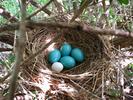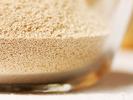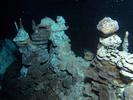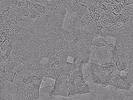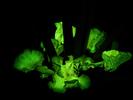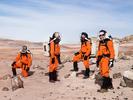Nell Greenfieldboyce appears in the following:
Wednesday, June 24, 2015
By
Nell Greenfieldboyce
The ribs of a 240 million-year-old fossil hold clues to how the first turtle shell evolved. And its skull shape seems closer to that of lizards and snakes than to an ancestor of dinosaurs and birds.
Monday, June 15, 2015
By
Nell Greenfieldboyce
If a starfish loses a limb, a new arm buds and grows in its place. But young moon jellies have a different strategy for self-repair: Existing limbs rearrange themselves to regain symmetry.
Wednesday, June 10, 2015
By
Nell Greenfieldboyce
Scientists say the Phoebe ring is "more than 200 times as big across as Saturn itself." They used a special infrared space telescope to get the best look yet at the massive ring of black dust.
Thursday, June 04, 2015
By
Nell Greenfieldboyce
Most tests for viruses aim to detect only one or two. But researchers can now check a drop of blood for antibodies to hundreds of viruses, tracing the history of a lifetime of infections, old and new.
Monday, June 01, 2015
By
Nell Greenfieldboyce
The littlest things — punctuation, precise word choice and grammar — can hold tremendous power in worldwide climate negotiations. This year in Europe, editors get a chance to help make history.
Tuesday, May 26, 2015
By
Nell Greenfieldboyce
Faux eggs made with 3-D printers are better than sculpted versions, researchers say, because it's easier to systematically vary their size, weight and other features. Next goal: 3-D fragile shells.
Thursday, May 21, 2015
By
Nell Greenfieldboyce
Genetically, at least, not that much has changed in the billion years since you two last shared a relative. Roughly half the 500 genes yeast need for life are interchangeable with the human versions.
Tuesday, May 19, 2015
By
Nell Greenfieldboyce
Genetic sleuthing and comparisons of recently discovered fossils with living snakes point to a "protosnake" ancestor that likely had tiny hind legs and lived about 120 million years ago.
Tuesday, May 12, 2015
By
Nell Greenfieldboyce
Hoping to help trace the history of how velociraptors evolved into birds, researchers at Harvard and Yale may have tracked a key beak transformation to two genes.
Monday, May 11, 2015
By
Nell Greenfieldboyce
It's a nightmarish job: No exercise or fresh air and little food and sleep for days at a time, all in an effort to persuade 200 countries to save Earth's climate and the planet. Can they do it?
Wednesday, May 06, 2015
By
Nell Greenfieldboyce
Near a field of deep sea vents between Norway and Greenland, scientists discovered the DNA of microbes that seem to be primitive archaea, but with a lot more genes — typical of complicated creatures.
Monday, April 06, 2015
By
Nell Greenfieldboyce /
Maanvi Singh
Some scientists suggest calling the era we live in the Anthropocene, to denote the time when humans came to dominate Earth's fate. But did it start with farming, the atom bomb or other event?
Monday, April 06, 2015
By
Cheryl Corley /
Nell Greenfieldboyce
Leaders of what some call a new civil rights struggle say the protests must lead to long-term strategies. The goal is to sustain a national movement and to get past challenging obstacles.
Friday, March 27, 2015
By
Nell Greenfieldboyce
During astronaut Scott Kelly's year in space, scientists will compare his physiology with that of his twin brother, Mark, to study the effect of prolonged space flight on the human body.
Wednesday, March 25, 2015
By
Nell Greenfieldboyce
Researchers were surprised by what they found when they sandwiched a drop of water between two layers of an unusual two-dimensional material called graphene.
Saturday, March 21, 2015
By
Nell Greenfieldboyce
A team of scientists recently created some fake, glowing mushrooms and scattered them in a Brazilian forest in hopes of solving an ancient mystery: Why do some fungi emit light?
The question goes back all the way to Aristotle, who is the first person known to have wondered about this, ...
Tuesday, March 17, 2015
By
Nell Greenfieldboyce
Public passion is all well and good, but it will take more than big talk to get to Mars by 2025, space specialists say. Even several rockets' worth of cash won't easily solve the technical challenges.
Thursday, March 12, 2015
By
Nell Greenfieldboyce
NASA says the biggest moon in our solar system has a salty ocean below its surface.
Researchers had suspected since the 1970s that a moon of Jupiter called Ganymede had an ocean. Now they've confirmed it, scientists announced in a teleconference held by the space agency.
Ganymede was discovered ...
Thursday, February 19, 2015
By
Nell Greenfieldboyce
Scientists have found some human DNA that, when added to mice, makes their brains bigger. But as DNA research into human brains goes forward, are there ethical lines we shouldn't cross?
Tuesday, February 10, 2015
By
Nell Greenfieldboyce
Before anyone tries to cool the Earth with technologies that could counteract global warming, there needs to be a lot more research into the benefits and risks. That's the conclusion announced Tuesday by a scientific panel convened by the prestigious National Research Council to assess "climate geoengineering" — deliberate attempts ...




